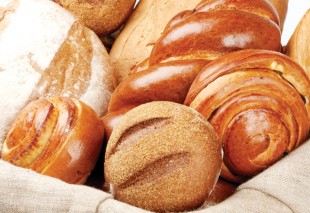

Addressing the bake-off

Many chefs may traditionally prefer to create their baked goods from scratch, but with demand increasing and kitchens having to cut back on costs, suppliers are seizing the opportunity to demonstrate how their products can increase efficiency and still deliver a top-quality product
From bread and other dough-based items to pastries and even desserts, baked goods have long played an integral role in the Middle East diet.
But in today’s cosmopolitan climate the demand is growing still further, according to the region’s chefs and suppliers.
At Kempinski Hotel Mall of the Emirates — where a new bakery concept recently opened at the hotel’s Aspen lobby lounge — executive chef Winfried Helmetag explains: “The demand for fresh bread and other European baked goods is no longer restricted to just ex-pat patrons. The cosmopolitan culture and multinational food offering in hotels have introduced traditionally western baked goods to a much wider audience.”
As Park Hyatt Dubai pastry chef Jocelyne Fallait notes: “Today, for every meal there is a baked supplement.”
Both Kempinski and Park Hyatt make all their bread and baked goods from scratch, the chefs explain.
“This way it ensures the product is free from preservatives and also is unique to this property,” says Fallait.
“In addition, home-made bread is of much higher quality than commercially pre-prepared items, as well as being more cost effective than bought-in products.”
But suppliers are fighting this preconception, as Advance Baking Concept (ABC) commercial manager Masood Syed explained at Gulfood 2010.
“There are a lot of misconceptions about fresh-from-frozen, so we are fighting that sterotype and educating people about the reality of the product,” he said. “I always believed the concept we offer, fresh-from-frozen, is more cost-effective than what people do from scratch.
“Formerly, when there was a lot of money to spend, people were setting up their own in-house bakeries — investing in the man power, the space, the machines and the raw ingredients. But we are definitely seeing more people embracing this method since the downturn,” he said.
Meanwhile at industry supplier Aramtec, food service manager Hossam Shabayk is also “a believer in convenience products”.
“Human beings in general tend to resist any new ideas and we faced a lot of difficulties in making this product line a success. But I think the perception has changed as chefs realise that convenience products are more of a help than a threat,” he reasoned.
“Also, since high technology got involved into the production of these items there has been a big shift in quality, and now that has really puts these products on the same level as items that are made from scratch.”
La Marquise International production line in charge Fadi Achour agrees that part-made products have become “more acceptable” over the past few years.
“Chefs are increasingly convinced to use ready mixes in order to save time, workers, and indirect expenses,” he notes.
At Puratos, whose products are distributed in the region by Baqer Mohebi Est, commercial manager — Middle East and Africa Walid El-Dana comments: “Bread and pastries are complex items to produce. Their manufacturing requires not only skilled and experienced professionals but also time and talent.
“In these top restaurants and hotels, chefs appreciate not only the level of quality we offer them but also the real partnership.”
Heidi Chef Solutions general manager Manuel-Yves Eckert adds that pastry chefs and bakers are “increasingly willing to look at other alternatives to scratch-made products, providing the quality meets their high standards”.
“The key drivers for this change are time and skill,” he adds. “Most hotel pastry departments’ teams are now leaner following staffing cut-backs, but are expected to produce the full pastry and bakery range.
“With the help of pre-mixes, semi-finished products and fully-finished products the chef has the option to schedule his time better and meet their deadlines.”
The way to overcome any lingering old prejudices, according to these suppliers, is by educating the market.
Aramtec’s Shabayk says the company achieves this through a variety of approaches —“from arranging demonstrations, to planning market visits for technical staff to go and meet chefs, to taking part in trade shows and even arranging visits for local chefs to our principle’s facilities overseas”.
As Puratos’ El-Dana puts it, the objective is “to be a reliable partner in innovation for our customers”.
And innovation alongside baked goods suppliers is the route the industry is taking, according to Park Hyatt’s Fallait.
“With demand increasing, I see more and more companies adopting a mix of fresh-from-frozen, bought-in mixes and totally home-made breads,” he admits.
Meanwhile Kempinski’s Helmetag believes more traditional regional items are going to be in demand.
“There is a big consumer trend towards focusing on simple, quality food products that showcase high-quality ingredients obtained from a particular region or made using certain time-honoured techniques,” he says.
And according to a multitude of baked goods suppliers, they are seeing increasing requests for healthy products.
Puratos’ El-Dana notes: “At our headquarters, we have a department measuring trends around the world. One they identified a few years ago was a growing demand for healthier food items — therefore we developed the Puravita range offering different mixes for health breads.
“More generally speaking, the group wants to further develop its health-conscious approach by paying particular attention to the nutritional benefits of the ingredients we use in order to offer balanced products.”
Whatever the future holds in terms of consumer demands, chef preferences and market availability, there is no doubt that the baked-goods boom is continuing in the Middle East: and the region’s pastry chefs, bakers and market suppliers are in a strong position to support it.